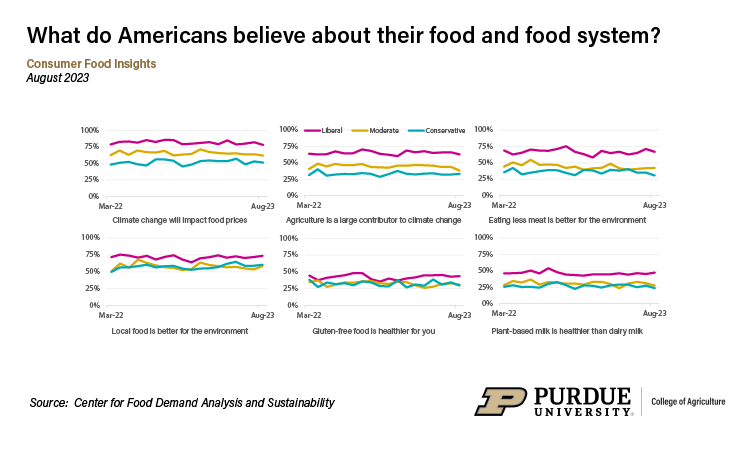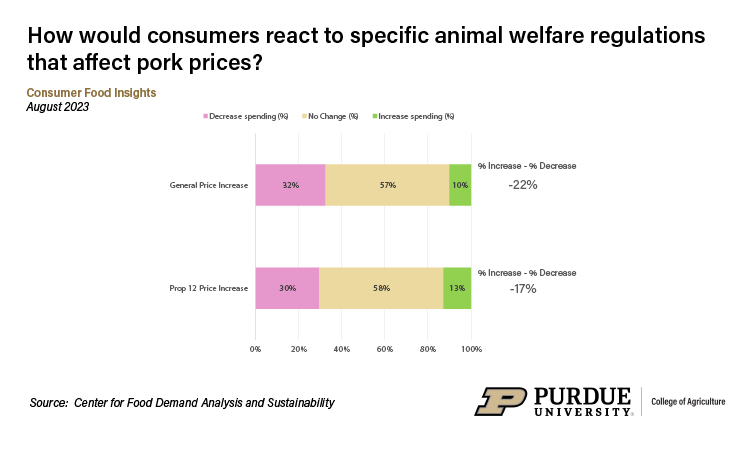Survey reveals influences of political ideology on consumer food perceptions
Consumers generally remain more optimistic about food prices compared to a year ago. However, individuals self-identified as having liberal political beliefs predict lower food inflation than those who identify as being conservative, according to the August 2023 Consumer Food Insights Report. The report’s authors noted that people who describe themselves as conservative report higher food price inflation over the past year (5.7%) than official government estimates (4.9%).
The survey-based report out of Purdue University’s Center for Food Demand Analysis and Sustainability assesses food spending, consumer satisfaction and values, support of agricultural and food policies, and trust in information sources. Purdue experts conducted and evaluated the survey, which included 1,200 consumers across the U.S.
“Food inflation expectations suggest consumers continue to believe that food price inflation is cooling,” said the report’s lead author Joseph Balagtas, professor of agricultural economics at Purdue and director of CFDAS. “Consumers also estimated a larger increase in food prices over the past year than is indicated by official estimates. This suggests that inflationary pressures are still very much at the forefront of consumers’ minds.”
Consumer reports of food spending show an increase of nearly 9% in food at home (FAH) spending from August of last year, while spending on food away from home (FAFH) has remained relatively unchanged.
“Consumers may be opting to eat more home-cooked meals as government measures show FAFH inflation staying higher than FAH inflation,” Balagtas said.
There are many positives to note in the category of food security and satisfaction. The survey’s tracking shows food insecurity has dropped two percentage points from July (16% to 14%) and is lower than the 2022 average for the first time in four months. The researchers also see a year-over-year decrease in the rate of consumers forgoing buying food while waiting for their next paycheck. These are all good signs of slowing food inflation during the past year, Balagtas said.
“Despite political differences, the U.S. food system continues to satisfy the diets, needs and tastes of a wide range of consumers,” he said.
Additional key results include:
- Reported grocery stockouts decreased by three percentage points from July.
- Consumers most satisfied with their diets (thriving) make up 67% of consumers, the lowest recorded by this survey.
- Consumer food values, beliefs and trust vary by political ideology.
The August 2023 survey results show little change between this year and last year regarding the attributes that individuals with liberal, moderate and conservative political beliefs consider important when buying food. The survey showed that people who identify as liberal value the social responsibility and environmental impact of their food purchases more than others. Individuals with conservative beliefs, meanwhile, place greater value on affordability, nutrition and taste.
 Share of Consumers Who 'Somewhat Agree' or 'Strongly Agree' with Claims about Food by Political Ideology, Mar. 2022 - Aug. 2023
Share of Consumers Who 'Somewhat Agree' or 'Strongly Agree' with Claims about Food by Political Ideology, Mar. 2022 - Aug. 2023 The survey questions about consumer beliefs and trust showed bigger differences between consumers of differing political ideologies.
“Statements regarding a connection between the food system and climate change fielded varying levels of agreement,” said report co-author Elijah Bryant, a survey research analyst at the center. “The responses to the statements about agriculture and meat consumption’s link to the environment reveal that a majority of people who check the liberal box agree, while a minority of those who check conservative agree with the statements.”
Bryant further noted that organizations such as the Food and Drug Administration continue to be trusted sources of food information by consumers of all political beliefs. Major news media outlets such as Fox News or CNN, however, tend to receive varying trustworthiness scores depending on political beliefs.
The latest report also looked at how consumers might alter spending on pork products in response to animal welfare regulation. This topic was inspired by the Proposition 12, Farm Animal Confinement legislation, which was passed in California and recently upheld by the Supreme Court.
 Changes in Pork Consumption by Price Increase, Aug. 2023
Changes in Pork Consumption by Price Increase, Aug. 2023 “This regulation increases the minimum space requirements for veal calves, egg-laying hens and breeding pigs on commercial farms that are located in California or supply California consumers,” Bryant said. “We find that consumers consider price as the most important attribute when buying pork products, while animal welfare is one of the least important attributes, on average.”
This remains consistent across different income levels. However, when consumers were asked to respond to two hypothetical price changes of the same magnitude, one that is a general price change and one that is caused by the Proposition 12 regulation, the following insight was revealed.
“We saw responses that suggest animal welfare may be more important to consumers than previously thought,” Bryant said. Even though the price increase is the same size, fewer consumers would decrease their spending on pork knowing that the price increase was caused by animal welfare regulations.
The Center for Food Demand Analysis and Sustainability is part of Purdue’s Next Moves in agriculture and food systems and uses innovative data analysis shared through user-friendly platforms to improve the food system. In addition to the Consumer Food Insights Report, the center offers a portfolio of online dashboards.





